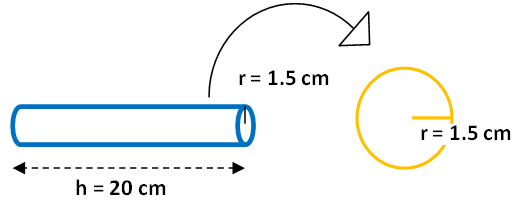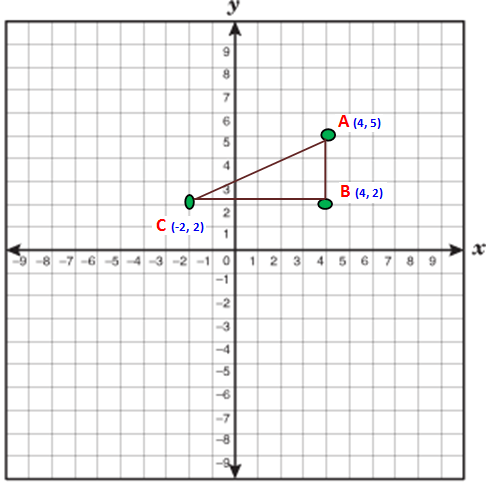10TH GRADE MATH WORKSHEET WITH ANSWERS
Problem 1 :
A rubber ball dropped from a height of 50 m rebounds at every impact from the floor to a height half of that from which is has fallen. Find the distance described by the time it comes to rest.
Solution :
Distance described in the 1st impact = 50 m
Distance described in the 2nd impact = 25
Distance described in the 3rd impact = 25/2
Distance described in the 4rth impact = 25/4
Distance described by the time it comes to rest
= 50 + [25 + (25/2) + (25/4) + ............]
Sum of infinite geometric series = a/(1 - r)
a = 25 r = t2/t1 ==> 1/2
S∞ = a/(1 - r)
= 25/(1/2)
= 50
Distance described by the time it comes to rest
= 50 + 2(50)
= 50 + 100
= 150
So, the correct answer for this question is 150 m.
Problem 2 :
A work was assigned to me on a Tuesday. I completed to work after 72 days. On what day, i completed the work.
Solution :
Tuesday corresponds to 2 in the clock.
Then, 2 + 72 = 74
When we divide 74 by 7, we get 4 as remainder.
4 corresponds to Thursday.
So, i completed the work on Thursday.
Problem 3 :
The radius of the top of a bucket is 18 cm and that of the bottom is 6 cm.Its depth is 24 cm. Determine the capacity of the bucket.
Solution :

Volume of frustum cone = (1/3) π h (R2 + r 2 + R r)
= (1/3) π (24) (182 + 6 2 + (18)(6))
= 8π(324 + 36 + 108)
= 8π(468)
= 3744 π cm3
So, the correct answer is 3744 π cm3
Problem 4 :
A solid metal cylinder is 20 cm in height and has a radius of 1.5 cm. This is melted down and cast into spheres each of radius 1.5 cm.How many spheres each of radius 1.5 cm can be cast from the cylinder ?
Solution :

Height of the cylinder(h) = 20 cm
Radius of cylinder ( R) = 1.5 cm
Radius of sphere (r) = 1.5 cm
Volume of cylinder = n ⋅ Volume of sphere
π R2 h = n x (4/3) ⋅ π r3
(1.5)2 ⋅ 20 = n ⋅ (4/3) ⋅ (1.5)3
(1/1.5) ⋅ (3/4) ⋅ 20 = n
n = (1/1.5) ⋅ 3 ⋅ 5
n = (5/0.5)
n = 10
Problem 5 :
In a higher secondary class, 66 play football,56 play hockey, 63 play cricket, 27 play both foot ball and hockey, 25 play hockey and cricket, 23 play cricket and foot ball and 5 do not play any game. if the strength of the class is 130. Calculate the number who play all the three games.
Solution :

Let A, B and C be the number of students who play foot ball, hockey and cricket respectively.
Number of students who play foot ball = 66
Number of students who play hockey = 56
Number of students who play cricket = 63
Number of students who play football and hockey = 27
Number of students who play hockey and cricket = 25
Number of students who play cricket and football = 23
Number of students who do not play any game = 5
Let x be the number of students who play all the three game.
Number of students who play any one of the games =
16+x+27-x+x+23-x+25-x+4+x+15+x
125 = 16 + 27 + 23 + 25 + 4 + 15 + x
x = 125 - 110
x = 15
Number of students who play all the three games = 15.
Problem 6 :
Determine the value of m if x+1 is a factor of
x3 + mx2 + 19x + 12
Solution :
Let p(x) = x3 + mx2 + 19 x + 12
x + 1 = 0
x = -1
Since(x + 1) is a factor p(-1) = 0
p(-1) = (-1)3 + m (-1)2 + 19 (-1) + 12
0 = -1 + m - 19 + 12
0 = -20 + 12 + m
0 = -8 + m
m = 8
So, the value of m is 8.
Problem 7 :
Find the square root of
(x2 - 4) (x2 + x - 6) (x2 + 5x + 6)
Solution :
= √(x2 - 4) (x2 + x - 6) (x2 + 5 x + 6)
= √(x2 - 22) (x + 3) (x - 2) (x + 2)(x + 3)
= √(x + 2) (x - 2)(x + 3) (x - 2) (x + 2)(x + 3)
= (x + 2) (x - 2)(x + 3)
So the correct answer is (x + 2) (x - 2)(x + 3).
Problem 8 :
The outer dimension of a bordered table are 72 cm and 108 cm. If the area of a table, excluding the border is 6400 cm2, how wide is the border ?
Solution :
Let x be the width of the border.
Outer length of table = 108 cm
Width of the table = 72 cm
Area of the table including the border
= 108(72) - (108-2x)(72-2x)
6400 = 108(72) - [108(72) - 108(2x) - 2x(72) + 2x2)]
6400 = 108(72) - 108(72) - 216x - 144x + 2x2
2x2 - 360x = 6400
x2 - 180x - 3200 = 0
(x - 160) (x - 20) = 0
x = 160 and x = 20
Problem 9 :
Find the area of the triangle whose vertices are
(4, 5) (4, 2) (-2, 2).
Solution :

Now we should take anticlockwise direction. So, we have to take the points in the following order.
A (4, 5) C (-2, 2) and B (4, 2)
Area of the triangle
= (1/2) [x1(y2-y3) + x2(y3-y1) + x3(y1-y2)]
x1 = 4 x2 = -2 x3 = 4
y1 = 5 y2 = 2 y3 = 2
Area of the triangle ACB
= 1/2 [4(2-2) + (-2)(2-5) + 4(5-2)]
= 1/2 [(-2)(-3) + 4(3)]
= 1/2 {0 + 6 + 12}
= 18/2
= 9 square units
So, required area of the triangle is 9 square units.
Problem 10 :
Find the equation of the straight line which joins the points A (5,1) and B (-2,2)
Solution :
Equation of the line joining two points
(y - y1)/(y2 - y1) = (x - x1)/(x2 - x1)
x1 = 5, x2 = -2, y1 = 1 and y2 = 2
(y - 1)/(2 - 1) = (x - 5)/(-2 - 5)
(y - 1)/1 = (x - 5)/(-7)
-7 (y - 1) = 1 (x - 5)
-7 y + 7 = x - 5
x + 7 y - 5 - 7 = 0
x + 7 y - 12 = 0
Kindly mail your feedback to v4formath@gmail.com
We always appreciate your feedback.
©All rights reserved. onlinemath4all.com
Recent Articles
-
Digital SAT Math Problems and Solutions (Part - 150)
Apr 25, 25 11:46 AM
Digital SAT Math Problems and Solutions (Part - 150) -
AP Calculus AB Problems with Solutions (Part - 19)
Apr 24, 25 11:10 PM
AP Calculus AB Problems with Solutions (Part - 19) -
AP Calculus AB Problems with Solutions (Part - 18)
Apr 24, 25 11:06 PM
AP Calculus AB Problems with Solutions (Part - 18)
